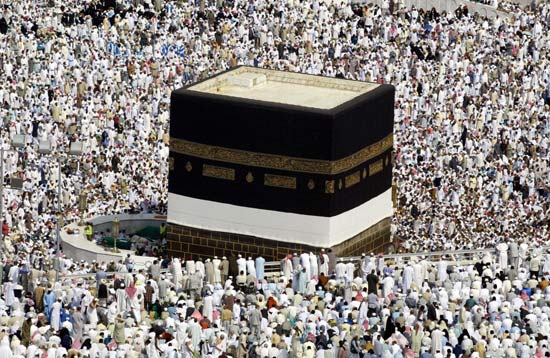Series Juz Amma
- This is post #23 in our series on Tafseer of Juz ‘Amma (click the link to see all posts in this series). Allah says, in Surah Tawheed, also known as Surah Ikhlas: قُلْ هُوَ اللَّهُ أَحَدٌ اللَّهُ الصَّمَدُ لَمْ يَلِدْ وَلَمْ يُولَدْ وَلَمْ يَكُن لَّهُ كُفُوًا أَحَدٌ Translation: Say, “He is Allah , [who is] One, Allah , the Eternal Refuge [As-Samad], He neither begets (gives birth to) nor is born, Nor is there to Him any equivalent.
The Carpet-Bombed Elephant
This is post #21 in our series on Tafseer of Juz ‘Amma (click the link to see all posts in this series). The Sabab-un-Nuzool (reason of revelation) for Surah Fil well-known; you can read all about it, along with some lessons and gems, in this post by Sr. Mariam 3.36. Please read it, since I won’t touch on those points. I will mention, however, two points not mentioned there–that the Christian tyrant king who brought his elephant, why did he decide to destroy the Ka’bah?Say: O You Kafiroon …
Note: This is post #20 in our series on Tafseer of Juz ‘Amma (click the link to see all posts in this series).
In Surah Kafiroon, Allah says:
قُلْ يَا أَيُّهَا الْكَافِرُونَ
لَا أَعْبُدُ مَا تَعْبُدُونَ
وَلَا أَنتُمْ عَابِدُونَ مَا أَعْبُدُ
وَلَا أَنَا عَابِدٌ مَّا عَبَدتُّمْ
وَلَا أَنتُمْ عَابِدُونَ مَا أَعْبُدُ
لَكُمْ دِينُكُمْ وَلِيَ دِينِ
Translation: Say, “O disbelievers, I do not worship what you worship. Nor are you worshippers of what I worship. Nor will I be a worshipper of what you worship. Nor will you be worshippers of what I worship. For you is your religion, and for me is my religion.” [Surah Kafiroon]
The mushrikeen (polytheists) of Mecca tried many, many different techniques to get the Prophet (salallahu alayhi wa sallam) to stop spreading Islam.
Before this ayah was revealed, they decided to make a pact with him. They said, “Look, how about this–you worship our gods for one year, and we’ll worship your God for one year.” And to sweeten the deal: “And, we’ll go first.”
And they applied the Broken Record technique. Whenever the Prophet (salallahu alayhi wa sallam) would try to speak to them about Islam, they would only repeat this.
And he, salallahu alayhi wa sallam, refused.
Those of you who are wondering why–although it seems on the surface like a fair trade, it’s not. Allah does not forgive shirk, worshipping other than him; not even a single sujood, or a single du’a, none of it is acceptable.
So clearly, this is not a contract the Messenger of Allah could engage with. So he refused.
And he refused.
And he refused.
Then, the Mushrikeen said, “ok, how about this–just speak highly of our gods, and we’ll do the same for you.” A smaller compromise.
And whenever people approached them, they would say, “Well, we’re trying to compromise (like we’re the good ones in this deal–even though we kill our daughters and murder on whims and …), but he’s not agreeing.”
So the Prophet (salallahu alayhi wa sallam) went to the ka’bah.

Mushrikeen were there. And in front of everybody he said:
Those Who Show Off in Their Salah
Note: This is post #19 in our series on Tafseer of Juz ‘Amma (click the link to see all posts in this series). In Surah Ma’oon, Allah says: فَوَيْلٌ لِّلْمُصَلِّينَ الَّذِينَ هُمْ عَن صَلَاتِهِمْ سَاهُونَ الَّذِينَ هُمْ يُرَاءُونَ وَيَمْنَعُونَ الْمَاعُونَ Translation: So woe to those who pray; those who are heedless of their prayer, those who make show [of their deeds]; And withhold [simple] assistance (al-ma’oon). [Surah Ma’oon, verses 4-7]Do YOU Encourage Good?
Note: This is post #18 in our series on Tafseer of Juz ‘Amma (click the link to see all posts in this series). Insha’Allah we’ll be kicking up the post frequency to three times a week in order to finish before Ramadan.
Allah says, in Surah Ma’oon:
أَرَأَيْتَ الَّذِي يُكَذِّبُ بِالدِّينِ
فَذَلِكَ الَّذِي يَدُعُّ الْيَتِيمَ
وَلَا يَحُضُّ عَلَى طَعَامِ الْمِسْكِينِ
Translation: Have you seen the one who denies the Repayment? For that is the one who drives away the orphan, and does not encourage the feeding of the poor. [Surah Ma’oon, verses 1-3]
Notice the connection here–verse one, the one who denies Ad-Deen, the Day of Repayment. And verse two and three? He drives away orphans, He doesn’t encourage feeding of the poor.
It’s not that he doesn’t feed the poor. It’s that he doesn’t encourange feeding the poor.
Al-Hakumu At-Takathur …
Note: This is post #17 in our series on Tafseer of Juz ‘Amma (click the link to see all posts in this series).
 Competition in [worldly] increase diverts you, until you visit the graves …
Competition in [worldly] increase diverts you, until you visit the graves …Allah says, in Surah At-Takaathur:
أَلْهَاكُمُ التَّكَاثُرُ
حَتَّى زُرْتُمُ الْمَقَابِرَ
Translation: Competition in [worldly] increase diverts you, until you visit the graveyards. [Surah At-Takaathur, verses 1-2]
Subhanallah, even though these verses were revealed over 1400 years ago, we still see the exact same situation today. Al-Haakum means, it makes you compete with each other. At-Takaathur is rivalry, competition, in accumulating material things; thinking that life is about toys, and the one with the most (or most expensive) toys wins.
What is Takaathur?
Indeed, We Gave You Al-Kawthar
Note: This is post #16 in our series on Tafseer of Juz ‘Amma.
 Indeed, We gave you Al-Kawthar.
Indeed, We gave you Al-Kawthar.Allah says, in Surah Al-Kauthar:
إِنَّا أَعْطَيْنَاكَ الْكَوْثَرَ
فَصَلِّ لِرَبِّكَ وَانْحَرْ
إِنَّ شَانِئَكَ هُوَ الْأَبْتَرُ
Translation: Indeed, We have granted you, [O Muhammad], al-Kawthar. So pray to your Lord and sacrifice [to Him alone]. Indeed, your enemy is the one cut off. [Surah Kawthar, verse 1-3]
Many of you know the hadith where the Messenger of Allah (salallahu alayhi wa sallam) was napping under a tree, and he woke up, smiling; and he said, Allah revealed to me this surah.
Interestingly, the ‘ulama have discussed this–is it possible that Allah sends revelation in a dream? The answer is, surprisingly, no; of the 6-7 ways, the most common is through Jibreel (alayhi salaam). Even here, there’s no indication that the surah was revealed through a dream–perhaps Jibreel (alayhi salaam) came to the Prophet once he had woken, and revealed it to him. (For more information, check our posts on Route 114: Uloom Al-Qur’an)
In verse 1, Allah says: Inna ‘ataynaaka al-kawthar. These two words allude to an enormous giver, giving an enormous gift. Allah could’ve just said: ataytuka al-kawthar; but that would’ve been weak, human speech. Instead, he uses inna–emphasis, and refers to himself in the “royal we” (something we have in English, too).
When the War-Horses Pant …
Note: This is post #15 in our series on Tafseer of Juz ‘Amma.

Allah begins Surah Aadiyaat by saying:
وَالْعَادِيَاتِ ضَبْحًا
فَالْمُورِيَاتِ قَدْحًا
فَالْمُغِيرَاتِ صُبْحًا
فَأَثَرْنَ بِهِ نَقْعًا
فَوَسَطْنَ بِهِ جَمْعًا
Translation: By the ‘aadiyaat, when they pant, and the muwriyraat striking (when their hoves strike the ground and make sparks), and the mughiyraat, at dawn (when they raid), stirring up thereby [clouds of] dust, arriving thereby in the center collectively, …
This is a qasam (oath), a big oath that spans five ayaat. I’m going to dive into word-for-word translation, because no translation can do justice (without paragraphs of brackets).
‘Aadiyaat (عَادِيَات) are horses (plural: sound feminine plural, in fact). Not those horses you see Canadian Mounties riding; but real, true, WAR horses. If you’ve ever seen war-horses (send us a picture!), they have a special, particular intensity to them.
Dabhaa (ضَبْحًا) means to pant. Pant meaning, if you’ve ever run in a 100-meter race, or tried to run until you’re tired, and you start breathing heavily through your mouth–that’s panting. Why are the ‘aadiyaat panting? Because they are charging into battle.
You’ll see lots of war concepts here. The Arabs at the time of the Prophet (salallahu alayhi wa sallam) knew these things very, very well; and when Allah testifies, these things he testifies by–nobody would deny them.
Muwriyaat (مُورِيَات) are also war-horses–the ones that strike. Strike meaning, when they run, their hooves strike up sparks on the ground. I definitely don’t encourage watching movies, so if you’ve ever read seerah stories, or perhaps Lord of the Rings, or similar books, you might find these kinds of concepts in their battles.
Mughiyraat (مُغِيرَات) are the raiding horses. In the time of the Prophet, they would have raids; you would see a whole army of horses and riders sweeping into a city, and they’d kill everybody and destroy it. Mughiyraat are those raiding horses that they rode.
The Reality of Time
Note: this is our 14th post in our series on Tafseer of Juz ‘Amma.

Allah says, in Surah ‘Asr:
وَالْعَصْرِ
إِنَّ الْإِنسَانَ لَفِي خُسْرٍ
إِلَّا الَّذِينَ آمَنُوا وَعَمِلُوا الصَّالِحَاتِ وَتَوَاصَوْا بِالْحَقِّ وَتَوَاصَوْا بِالصَّبْرِ
“By Time. Indeed, mankind is at loss. Except for those who have believed, done righteous deeds and advised each other to truth and advised each other to patience.” [Asr: 1-3]
Allah swears by time–which shows how enormous and noble this creation is. Time.
Imam Shafi said about this revelation that had it been the only revelation sent to mankind, it would have been enough. What motivated him to say this?
Tafseer of Surah Inshrah
Note: this is our 13th post in our series on Tafseer of Juz ‘Amma. Stand up and do more. Muslims don’t retire or quit from working for the deen. Persist. Be like the flower that springs through concrete. Allah says, in verse 3: وَرَفَعْنَا لَكَ ذِكْرَكَ Translation: And raised high for you your repute. If you see those polls on CNN and BBC and all those places, “Who is the most famous person in the world?